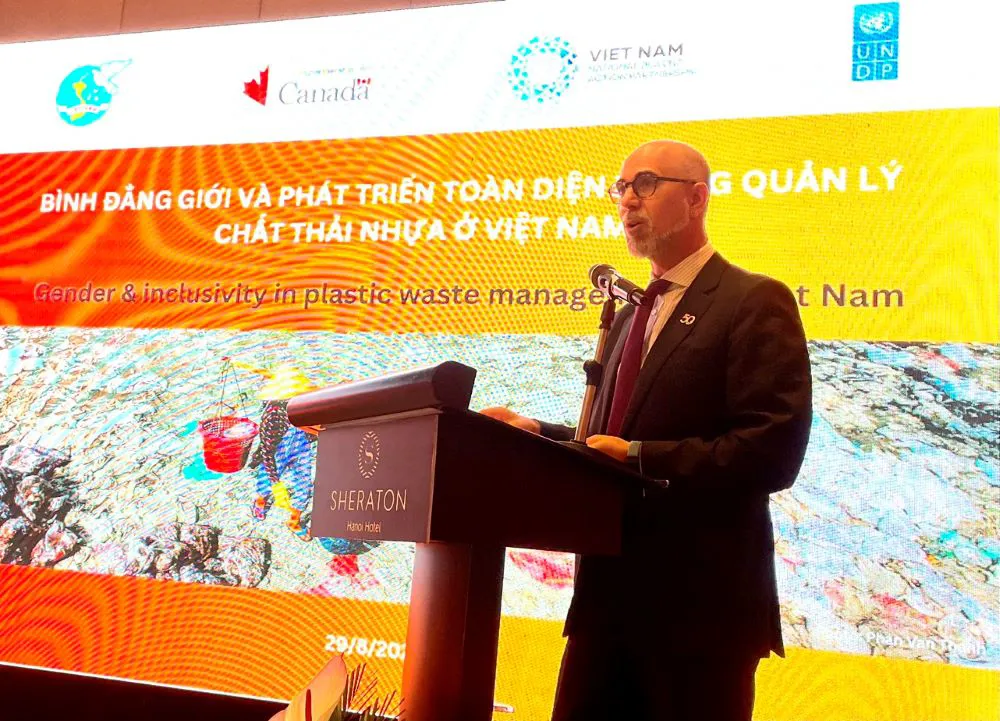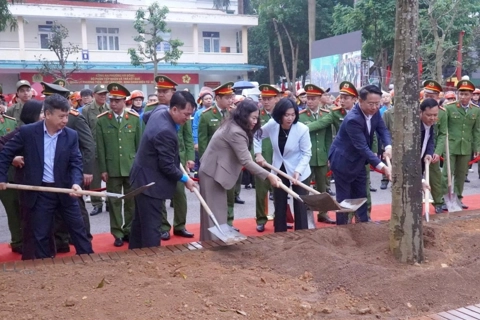Women important in addressing plastic pollution in Vietnam
Vietnam’s policymakers are urged to mainstream gender equality and inclusivity to identify environmental protection and actions against plastic pollution.
Women are vital to the collecting, sorting, and recycling of plastic at homes and in communities in both official and informal settings.
| Patrick Haverman, UNDP Deputy Resident Representative Vietnam, speaks at the workshop held in Hanoi on August 29. Photos: UNDP |
Patrick Haverman, UNDP Deputy Resident Representative, shared the view at a National Plastic Action Partnership (NPAP) workshop on Gender Equality and Social Inclusion in Plastic Waste Management held in Hanoi on August 29.
As women hold crucial role in addressing plastic pollution in Vietnam, it’s necessary to mainstream gender equality and inclusivity. For that reason, experts discussed women’s roles and contributions and how to enhance gender equality and inclusivity in plastic waste management at the household and community levels.
It emphasizes the need to include gender and social inclusion issues in the joint action plan by the Women's Union, Canadian Embassy, and UNDP Vietnamand other members of the NPAP platform.
Regarding state management, it’s important to integrate fragmented solutions into an inclusive and sustainable plastic circular economy by leveraging resources from policymakers, experts, enterprises, and development partners.
“Authorities and communities should consider women’s roles during policy formulation,” said Patrick Haverman.
He added that policymakers need more research, data, or evidence on plastic, gender, and social inclusion issues to avoid any adverse impacts on women, migrants, and other vulnerable groups when implementing the Extended Producer Responsibility (EPR) policies and other relevant policies.
Shawn Steil, Canadian Ambassador of Canada to Vietnam, said a circular economy approach is needed to tackle how we produce, use and dispose of plastics and coming to grips with the growing challenges related to human health, gender equality and social inclusion.
“In Vietnam, we all know that women play a central role in entrepreneurship, resource management, waste disposal and unpaid care work – much of which takes place in the informal sector,” he stressed.
He added that Canada’s programming focuses on supporting women’s rights and livelihoods that complement efforts to transition to a more sustainable and circular plastics economy.
| Shawn Steil, Canadian Ambassador of Canada to Vietnam, at the event. |
Efforts
The workshop aims to share the findings of the Vietnam NPAP report on “Gender equality and social inclusion (GESI) in the plastic value chain in Viet Nam” and raise awareness amongst relevant national agencies and other stakeholders on promoting gender and inclusivity issues in plastic waste management.
Based on solid baseline research and analysis of relevant literature, the GESI report highlighted an assessment of the gender context and social inclusion issues in Viet Nam's plastic waste management system.
This baseline research was conducted through an online survey with 601 community respondents, 9 group discussions with 63 formal and informal waste workers in Hanoi, Ha Tinh, and Thua Thien Hue, and interviews with 33 representatives and experts from the central level policy-making and governance of plastic waste management.
The research showed that women take primary responsibility for managing daily housework and are also disproportionately affected by using plastic items. However, there remains a lack of research on the impact of plastic waste on the health of women, children and the elderly, as well as pregnant women.
“We hope the GESI report launched today will inform the way we work together to ensure gender equality, inclusion, diversity and environmental stewardship in Vietnam,” Ambassador Shawn Steil emphasized.
At the workshop, the Vietnam Women’s Union also presented the Orientations of their activity plans in environmental protection and plastic waste reduction. From gender and environmental perspectives, including plastic waste issues, the union continues to identify environmental protection and actions against plastic pollution.
Participants at the workshop exchange ideas and plans, which can help move Vietnamtoward a plastic circular economy that is sustainable and includes everyone.
| Participants at the workshop. |
Vietnam National Plastic Action Partnership (NPAP)
The Vietnam National Plastic Action Partnership (NPAP), hosted by UNDP Viet Nam, is a national-led multi-stakeholder platform that enables collaboration between the government and other partners to transform the commitments of reducing plastic waste and pollution into actions.
The Vietnam NPAP Leadership Board, chaired by the Vice Minister of the Ministry of Natural Resources and Environment and comprising of 34 members who are senior leaders of organizations, associations, and enterprises actively against plastic pollution, has approved the NPAP work plan in 2023 with the vision until 2030.
It focuses on promoting innovative solutions, unlocking finance, informing policy and boosting gender equality and social inclusion to shape a more sustainable plastic circular economy. https://www.globalplasticaction.org/vietnam















